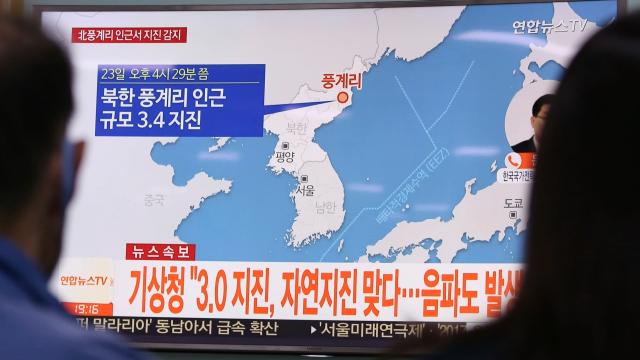A 3.4-magnitude earthquake rattled the area of Kilju in northeastern North Korea on Saturday, CBC reported, 6km short of the Punggye-ri facility where the country has tested nuclear weapons.
Photo: AP
The area where the earthquake struck is not known to experience natural earthquakes. As earth-shaking booms are a natural feature of underground nuclear weapons testing, the quake led to suspicions North Korea had detonated yet another model of nuke — as it did earlier this month, sparking fears it had successfully developed a hydrogen bomb.
“This event occurred in the area of the previous North Korean Nuclear tests,” the United States Geological Survey wrote on its website. “We cannot conclusively confirm at this time the nature (natural or human-made) of the event. The depth is poorly constrained and has been held to 5km by the seismologist.”
According to the Washington Post, China’s state earthquake-monitoring agency initially believed the test to have been an explosion, although South Korean officials told the Associated Press “the analysis of seismic waves and the lack of sound waves clearly showed that the quake wasn’t caused by an artificial explosion.”
Per the AP, the 3.4-magnitude quake would be much smaller than previous nuclear tests, the weakest of which generated a magnitude 4.3 quake and the strongest of which, the test this month, resulted in a magnitude 6.3 quake. One possible explanation is the region is undergoing aftershocks in the wake of the previous nuclear tests.
“It could be a natural earthquake that really was man-made as the nuclear test would have transferred a lot of stress,” Yonsei University in Seoul earth system sciences professor Hong Tae-kyung told CBC. “The quake is small enough to suspect that it could have been caused by a tunnel collapse, and satellite data shows there have been many landslides in the area since the nuclear test.”
Other than the disquieting pace of North Korean nuclear weapons development, one immediate concern from the ongoing tests is seismological data suggesting the test site might be about to cave in.
Researchers at the University of Science and Technology of China in Hefei, Anhui province concluded earlier this month another test at Punggye-ri could cause the overhead mountain to cave in, potentially releasing large amounts of radioactive material which could drift far beyond the region into neighbouring countries including China.
According to South Korean paper Chosun Ilbo, sources said after the September 3rd test, residents in the area were prohibited from travelling to the capital, Pyongyang, due to possible radioactive contamination.
[CBC]
